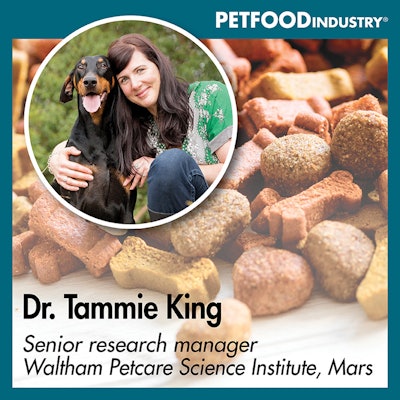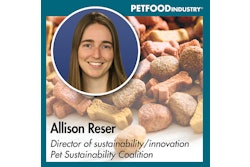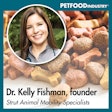
Join host Lindsay Beaton as she speaks with Dr. Tammie King, senior research manager at the Waltham Petcare Science Institute, Mars Petcare, about the groundbreaking PAWS (Pets and Wellbeing Study) program. Building on Waltham's history of studying human-animal relationships, the program investigates how pets positively impact human wellbeing and where the research can go into the future.
The transcript below is from Episode 86 of the Trending: Pet Food podcast, where host Lindsay Beaton and Dr. Tammie King, senior research manager at the Waltham Petcare Science Institute, Mars Petcare, examine the importance of understanding the human-animal bond. You can find the episode at Trending: Pet Food Podcast, on SoundCloud or on your favorite podcast platform. This episode originally aired on May 7, 2025.
We want to thank Coperion for sponsoring this podcast. Coperion brings together some of the world's most trusted technology brands to offer innovative system and ingredient automation solutions to pet food producers worldwide.
Lindsay Beaton, editor, Petfood Industry magazine and host, Trending: Pet Food podcast: Hello, and welcome to Trending: Pet Food, the industry podcast where we cover all the latest hot topics and trends in pet food. I’m your host and editor of Petfood Industry magazine Lindsay Beaton, and I’m here today with Dr. Tammie King, senior research manager at the Waltham Petcare Science Institute, Mars Petcare. Hi Tammie, and welcome!
Dr. Tammie King, senior research manager at the Waltham Petcare Science Institute, Mars Petcare: Hi Lindsay. Thanks for having me.
Beaton: In case you’re unfamiliar with Tammie or the Waltham Petcare Science Institute, here’s what you need to know.
Dr. King holds a Ph.D. in anthrozoology from Monash University and Bachelor of Science with Honors in zoology/animal behavior from The University of Melbourne. At Waltham, as part of the Research Leadership Team, Tammie is responsible for overseeing a large portfolio of research which investigates the physical and emotional health of pets, as well as the impact pets have on human wellbeing – as part of the Global HAI Pets And Wellbeing Study (PAWS) program. She is passionate about ways in which evidence-based knowledge can be shared to improve dog and cat health, as well as strengthen the human-animal bond, making a better world for pets and people.
The Waltham Petcare Science Institute is Mars Petcare’s science center. The Institute has been advancing pet health and nutrition for more than 60 years, with a mission to improve the lives of pets through science, all in support of Mars Petcare’s purpose: A better world for pets.
Mars is a global leader in pet care, spanning comprehensive veterinary care, nutrition, breakthrough programs in veterinary diagnostics, wearable health monitoring, and pet parent platforms. The company has over 100,000 associates helping pets, their owners and pet professionals in more than 130 countries.
Tammie’s extensive experience and research into pet health and well-being, alongside her involvement in the PAWS program, are why I’ve brought her on today to answer this question: What is the importance of understanding the human-animal bond to a successful pet industry?
Tammie, I want to ask a foundational question, first about the human animal bond and its importance to pet ownership. What sort of foundation does that bond build in the whole idea of pet ownership and the evolution of it?
King: Lindsay, thanks for the question. I think that's a huge question. I think to start with it's important that we acknowledge the evolution of pet keeping, of pet ownership. Originally, there were a lot of pets being working animals for people, so having a utilitarian function, dogs in particular, that were supporting people with herding livestock, guarding their properties, cats that were looking after barns in relation to rodent control and things like that, to where we are now, which I think is very different. We need to acknowledge that pet ownership is constantly evolving.
Nowadays, pets are seen more as companions. We know that 56% of people worldwide own pets primarily as companions, as opposed to working animals. That's not to say that working animals don't exist, but this pet population is booming around the world. It’s important, I think, that we study these human pet relationships to better understand the impact that pets have on people through these complex relationships and how people impact pets.
Beaton: Do you think there's more of a blurred line between working animals and companion animals than there used to be? Do you think there are people who consider their working animals pets? And how does that play into what you study when you're drawing the line between a companion animal and a working animal?
King: That's a good question. So, there are dogs and pets that exist to support people in myriad ways that can be done through assistance dogs, like animals used in therapy interventions to support people, hospitalized adults and things like that. We know that pets are important to people around the world. People intuitively say, “My pet's good for me,” but we need to ensure that we can have credible science to back that up as well and acknowledge this complexity in human pet relationships.
I think you're right in thinking that, yes, pets are here to serve many purposes. I would say that it could be sometimes in a working situation, but also people can be deriving benefit for animals that aren't traditionally seen as working animals.
We know that more than a third of pet parents consider their pets the most important thing in their lives. This is even higher in Gen Z and millennials. This again comes back to the point of the evolution of pet ownership, and what does it mean for different generations?
Another important factor is that people are more cognizant of their own mental health and wellbeing, so they're thinking about what that means for their pet -- similarly, how their pet potentially can be supporting them in these situations. COVID played a big role in that evolution, that shift in how we see pets.
It’s critical that we deepen our understanding, and that's where the Waltham Petcare Science Institute is best placed to explore the intricacies of those relationships and understand when these relationships good in what situations, in what context, and when can sometimes it be challenging, and how can we generate evidence-based understanding to support people in those situations, as well as their pets, to ensure that it's a mutually beneficial relationship.
Beaton: I think that's an important mission. Obviously, this is a pet food focused podcast by and large, as my audience is anybody who has anything to do with the pet food space. The bond has evolved and clearly affects how pet owners take care of their pets today compared to how they used to take care of them. One of the biggest parts of taking care of an animal is its nutrition and its feeding. What have you seen in the research that gives you any idea of how exactly that bond affects how pet owners take care of their pets compared to how it used to be?
King: I think that comes back to the point about people being cognizant of their own health and wellbeing their own nutrition, what's important for them to maintain good health, and then what could they be doing to improve the lives of their pets as well? We don't have any research specifically on that topic within the program, but it's not to say that by developing a deeper understanding of the impact that pets have on human wellbeing could help shift this focus on science has been able to demonstrate that taking my dog for a walk lowers my blood pressure and increases interaction with other people and calms me. Then how can I be better looking after and supporting my pet in this instance as well?
I think that's where it's important for the pet food industry to take note -- that it's critical that we understand these complex human animal relationships, and how do we best provide for these pets in these environments as well? Because it is complex.
Beaton: Speaking of that complexity, we are going to spend the bulk of our conversation talking about PAWS, so I would like to hear the origin story of where the idea for PAWS came from, and overall, how it came to be.
King: The PAWS program -- and PAWS stands for the Pets and Wellbeing Study program -- comes back to this notion that wellbeing is an increasing priority for people. We know that around 45% of people across 30 countries identify mental health as a top priority, a top health concern for them. It's called out in the World Health Organization as a focus area as well. People are more cognizant of this.
We also know things like anxiety and stress are rising across the globe. It's affecting millions of people worldwide. So, how can we support people? At Waltham, we have a long history of high-quality science looking at the relationships between pets and people, being able to demonstrate how pets positively impact different populations of humans around the world. A recent study partnering with the University in Arizona showed that pets can provide stress relief and emotional support for children, and that children stroking a dog releases oxytocin, in both the child and the dog. There's a mechanistic situation going on there where something is happening with this relationship and those positive interactions.
We've also had research conducted at Waltham looking at college students who interacted with dogs prior to examinations. They're feeling stressed and looking at how it can manage stress in those environments to boost attention and memory. For adults, we know that dog ownership is associated with 24% lower risk of death over the long term, when compared to non-owners. For veterans who suffer from PTSD, those symptoms are reduced in the presence of a dog.
There is all this evidence over time that we're gathering to demonstrate that pets can be good for people and populations such as older adults, where loneliness is becoming a bit of an epidemic around the world. How can we support these older adults? How can we address the population around the globe in all these different geographies? To your question around PAWS, it's about, “Okay, we identify that mental health is a concern across the globe. We know that there is evidence to suggest that pets are good for people, and not just older people, but also adults, adolescents and children. So how can we build upon this with credible research that also ensures that we make a step change in the field of human animal interaction?”
Because traditionally, it's quite a small field. It's not very well funded. We tend to see these small pockets of research that often address … it's a small population of people. It might be localized to a small geography, or generally North America or Europe. But how do we better understand human pet interactions across the globe longitudinally, generating evidence based over time? That's where PAWS is unique.
We are investing in a long-term multi-study commitment for us to be able to better characterize the impact that pets have on human mental health and wellbeing, and we will be leading that from the Waltham Pet Care Science Institute but really partnering with credible academic institutes and experts around the world.
We have a really great set of minds coming together that generate various disciplinary perspectives -- from zoological science to veterinary science to sociology -- ensuring that we're focusing on that multidisciplinary approach to really answer those important questions. Because we can't do it alone. We need to partner with the right groups and invest in this field of human-animal interaction.
Beaton: When you say the word “pets,” did you guys self-select to just focus on dogs and cats, or are we talking any kind of pet whatsoever?
King: That's a good question. Our focus is primarily cats and dogs. I think that's a good point that you make, because traditionally, within human-animal interaction, focusing on companion animals, we tend to see a lot of studies that are predominantly dog focused. What's going to be great about the PAWS program, which we've recently launched, is we have a portfolio of research within the program currently. We are specifically ensuring that we have a balance of studies that look at both cats and dogs, that look at a range of human populations, that look at human pet relationships and the complexity that they bring across different geographies.
We're truly this large scale, global evidence-based program that can deliver credible knowledge to really understand these relationships, and where we really can then support people and their pets.
Beaton: When you mention all the different experts who are going to be involved in this, it sounds like you have experts who work more on the companion animal side of things, and then people like sociologists who work more on the human side of things. How did you go about finding people to be involved in this project? What was the response like when you reached out and said, “Hey, we're doing this multi-year study on the human-animal bond. Do you want to be involved?” Was it something they were excited about? What was the response initially?
King: I think the good thing about the program, as I said, is it’s a multidisciplinary research program. We are engaging with people across the world. Currently, over 35,000 people will be participating in research that encompasses this program across more than 20 countries. This is the initial phase, and we plan to be building that over time.
Regarding the universities that we're partnering with, we will be partnering with teams at Tufts University, University of Pennsylvania, University of Arizona, as well as groups like YouGov, and mental health groups like Calm as well.
To your point about what were people's responses? Excited and pleased to be part of such an innovative initiative that focuses on building great science in this field and investing to be able to deepen our understanding, shifting the needle, to be able to support pet ownership, to be able to support the human-pet bond, to be able to support animal welfare. That’s why it is important that we have a range of researchers from different backgrounds, as you said, that can focus on the human, which we are very interested in. What does this mean for human mental health and wellbeing? But notwithstanding, we need to also consider what it means for the pet in this situation as well. What does it mean for the cat and the dog?
Beaton: You also mentioned earlier that there have just been small pockets of research, and that this is --from a science perspective --an under-researched area. Although if you go to any pet owner and ask them how they feel about their pet or what their pet does for them, anecdotal evidence abounds.
What gap in research are you hoping to fill? What slot do you believe will eventually fall into in the pantheon of the human-animal bond research that has already been conducted? Do you have a specific hole that you're looking to fill, or are you going to do the research and see where it takes you?
King: We get this a lot in the field of human animal interaction. You know the pet owners saying, “Oh, why do we need science to answer that? We know this already.” We see it in other fields as well. There is this intuitive belief that pets are good for people. Otherwise, why would we have them? And you're right -- anecdotally, people will say, “Well, yeah, of course, they help me rest and relax.”
As I said, I think we need to acknowledge the complexity, and the best way to be able to do that and to make that step change in research in the field is to tackle this using an innovative approach.
Rather than reinventing the wheel, as it were, with research that's been conducted previously -- there's some great research out there that has provided foundations and building blocks for where we should be focusing on next -- but I think where we are at the moment, to be able to deliver to this multi-study long-term commitment is ensure that we have the right disciplines in the program and the right methodological approaches.
The important thing to focus on for us utilizing a mixed-methods approach, so not focusing primarily on quantitative measurable data, which traditionally has what's been used in the past, and that could be generated through survey instruments. It could be generated through physiological parameters, heart rate, etc., but not excluding these, because these are critical to understand underlying mechanisms through these human-pet interactions.
In order to be able to understand the complexity and the nuances and the reasons why people might be feeling in certain ways, we need to ask them, and we need to dig deeper by conducting qualitative research, and that can be done through in-depth qualitative interviews, for example, to be able to help us understand the types of results we might be getting.
Another thing within the human-animal interaction field is that often we see mixed findings. We see some research that's published to say that pets are great for us, right? This is what the public is saying. You know, they make us happier, they lower our heart rate. They help us in a myriad of ways. Then you see other published papers that say, “We saw no effect.” Pets weren't necessarily good for people in this instance.
Now that's not to say the research is good or bad or right or wrong. It's potentially because the approach that was taken, the methodological approach, didn't dig deep enough to truly understand what people were thinking and feeling to help us unravel this complexity. I think that is going to be a huge difference in how we're approaching this program of work, whilst partnering with credible academics around the globe and truly building up a picture of what human-pet relationships look like in different parts of the world. Traditionally, we seem to look at it from a North American-European lens, and that's not the same for everyone around the world. How can we be culturally sensitive? How do we support people all around the globe in this global initiative utilizing these innovative approaches to collecting data?
Beaton: How long are you expecting this to take? Do you have a defined end date, or are you going to go until you have everything you want?
King: We don't have a defined end date because I don't think pet ownership has a defined end date. It continues on and on, right? I would say the Waltham Petcare Science Institute has been investigating human-animal interaction for many, many years. We're a scientific institute that’s been generating science for over 60 years in a range of disciplines, looking at pet health, but also the impacts and understanding how pets impact people. I would imagine it continues.
What we need to be cognizant of is how we approach this. Who are we partnering with? How do we ensure we're doing robust, credible research? How do we ensure the insights that we're gathering from this program can inform relevant policies and help develop evidence-based, tailored solutions? For instance, pet ownership policies, such as promoting pet-friendly workplaces.
If we were generating evidence to suggest that workers’ stress is lower with their pets around them, and we have seen studies suggesting that. Or pet-friendly housing, for example, or more green spaces so people can take their pets to various communities, this research will be critical to inform that and support pets and people around the world.
Beaton: What most fascinates you about the human-animal bond?
King: I touched on this when we first started talking. I would say it's being aware that what we see now isn't necessarily what we're going to be seeing in 10, 15-, 20-, 30- or 50-years’ time. We must remain mindful of this evolution of pet ownership but ensure that research can adjust and adapt and really understand those trends and the intricacies of those relationships. What can we do with that information to really support pets and people in the community? That’s what excites me -- real world impact.
Beaton: Is there anything you’re really looking forward to diving into from a research perspective? A particular avenue that you're just excited to see the data from or participate in?
King: Sure, I think what I touched on earlier about the innovative approach around mixed methods. We have a great team of human-animal interaction researchers based at Waltham who collectively are excited about how we can make this step change into promoting more of a mixed methods approach in this field and partnering with leading academics.
There is an upcoming symposium at the International Society for Anthrozoology this summer where the team are presenting some of the research that's currently being done within the program. That's great to see, right? These active collaborations, these innovative research approaches, and some of the projects that we're seeing emerging, and this is just the start, right?
This is a multiyear program, so we're just kicking off. We expect to see deliverables that will inform across the duration of the projects, through peer-reviewed scientific publications. Keep your eye out for the journals. There'll be publications coming out. As I said, not just focused on dogs in Europe or North America, looking at cats as well. I'm excited to see that. I'm excited to look at this balanced portfolio of work using these innovative research methods and partnering with credible experts around the globe.
Beaton: As we wrap up our conversation, I want to know what you think the knowledge gained from this study — whatever that knowledge ends up being — can do for pet owners, and what it can do for the various aspects of the pet industry, whether that's pet care, pet food, veterinary services or nutrition? What are you hoping that all this knowledge is going to be able to do for everybody who might be reading the knowledge a few years from now?
King: sure. Regarding the PAWS program itself, as I said, it's just at the beginning and consists of multiple individual studies. We are designing it to look at both cats and dogs across the globe with different populations of people, depending on the specific topic of interest.
A nice one to be able to highlight is the work that we are doing with Tufts University, looking at how pet dog interactions impact feelings of loneliness and social anxiety in adolescence. I think adolescents are a population that we should be focusing on and understanding how we can be supporting these young adults.
You can imagine that research findings that come out of that study and others could support pet-keeping policies, as I alluded to earlier, where pets may be accessible or not, depending on our research findings.
I think you asked about the pet food industry and the veterinary industry. As this program evolves, it's not only looking at pets and the impact they have on these different populations around the world, but the interactions that people have with pets in a clinical setting. In terms of veterinary care, what does that mean for clinicians who are working with pets and owners’ attitudes and owners’ behavior around taking pets to the vet, for example? I think that's an area we could focus on in the future.
Recognizing that cats, for example, don't tend to visit the vet as frequently as dogs. We know this, right? They're not getting the veterinary care that they should be, and often diseases are going undiagnosed or they're not getting adequate treatment. How can a program like this better understand the relationship of people's attitudes towards veterinary care or barriers as to why they might not be taking their pet to the vet? How can that be informing how clinicians interact with pets, or how veterinary surgeries potentially are set up? I think there are ways to be able to explore that further that touch upon various entities within the pet care industry, for sure.
Beaton: Well, I really want to thank you for coming on today, Tammie. As soon as I heard about this research, I knew I had to cover it on the podcast because of its scope, because of its potential influence on various aspects of the industry. It's just fascinating. We've talked about anecdotal evidence versus research-backed evidence, and how pet owners will tell you what pets have done for them and to be able to see or -- I guess what I'm expecting to see -- is some validation of that in the scientific space, and then results we can't even imagine yet, because that's how science works. It’s just fascinating.
I'm really looking forward to following this and continuing to cover it for the industry. It was great to talk to you today about something that is so important and could be so groundbreaking for anybody who deals with pets, whether they're owners or people in the industry, so thank you for being on today.
King: Thank you very much for having me. It was a pleasure.
Beaton: Before we go. I always like to do a little plug for my guest. So where can people find more information about you and all the work you're doing?
King: As I mentioned, the PAWS program research will be published in peer-reviewed journals, and summaries of that research can be found at Mars Pets Wellbeing website, as well as general information about the program and [email protected]. We’ll also continue to share updates from the program via our Waltham Petcare Science Institute LinkedIn channel. Follow us to stay up to date with the program.
Beaton: Perfect. That’s it for this episode of Trending: Pet Food. You can find us on PetfoodIndustry.com, SoundCloud or your favorite podcast platform. You can also follow us on Instagram, @trendingpetfoodpodcast. And if you want to chat or have any feedback, I'd love to hear from you. Feel free to drop me an email: [email protected].
Of course, thanks again to our sponsor, Coperion. Coperion brings together some of the world's most trusted technology brands to offer innovative system and ingredient automation solutions to pet food producers worldwide.
Once again, I'm Lindsay Beaton, your host and editor of Petfood Industry magazine, and we'll talk to you next time. Thanks for tuning in!
















